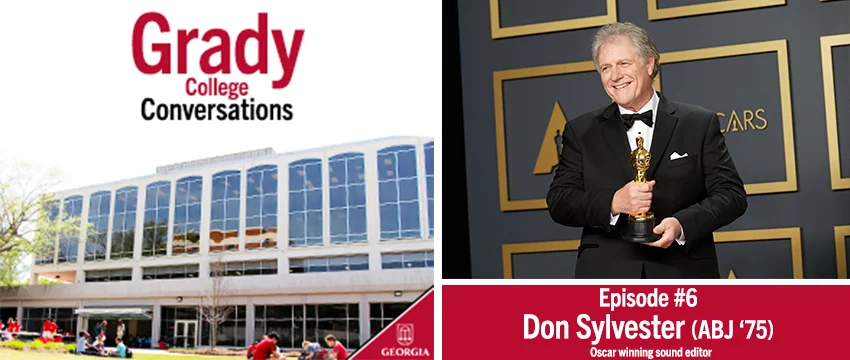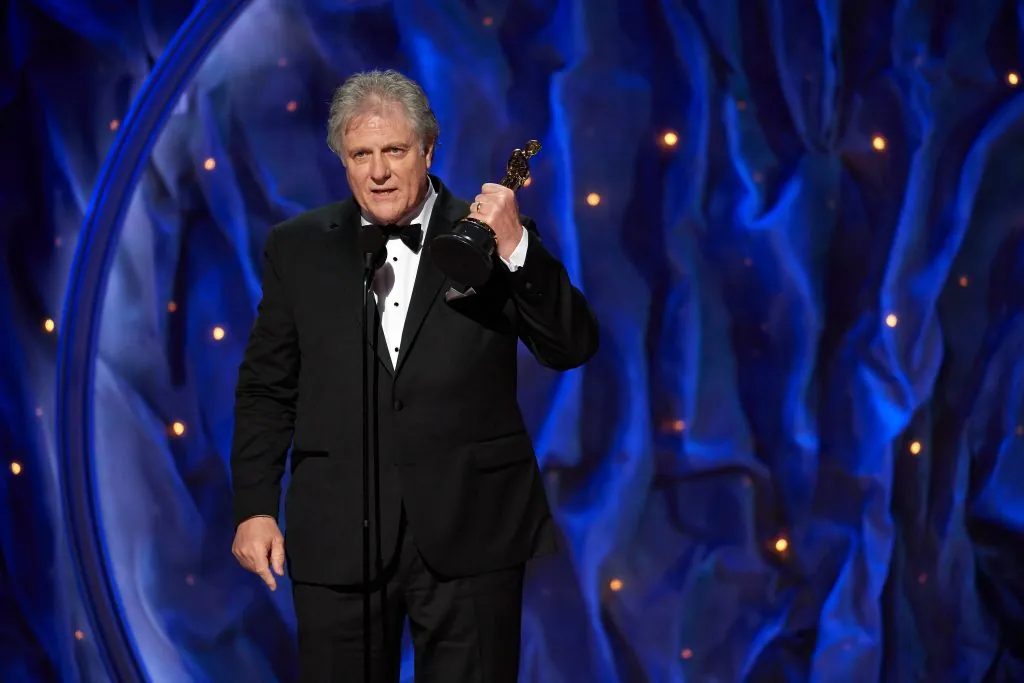Don Sylvester reflects on winning Oscar for sound editing

Don Sylvester reflects on winning Oscar for sound editing
Don Sylvester (ABJ ’75) recently won the Oscar for sound editing on “Ford v Ferrari.” He joined Dayne Young and Jay Hamilton, Grady’s entertainment and media studies department head, on “Grady College Conversations” to discuss the intricacies of film sound editing, the awards season for “Ford v Ferrari” and his time as a student at Grady College.
Learn more about Grady Podcasts here. Subscribe to our Apple Podcast feed. Listen to us on Spotify.
Grady: What was the awards season experience like for you?
Don Sylvester: “This is my first go at it. I knew there was an awards season from a spectator’s standpoint. I was never involved in this cottage industry where it is hundreds of people and dozens of awards. It is all kinds of effort put into promoting films. They put me on this gig. It was a part time job for me. Now that it is over, I have some extra time. I’m not working until 11 o’clock every night.”
Grady: How did you end up at Grady College?
Don Sylvester: “I grew up in Atlanta. There was never any doubt that I would end up in Athens. My sister went before me. It was the only school I applied to. I thought I would be in television news and that is where my focus was while I was in school. I did do that for a while. I worked at WAGA for a while. As I grew and became more aware of the world, I migrated toward music. That led me to film. I’ve been doing film for about 30 years or so.”
Grady: How did you make the transition from music to film?
Don Sylvester: “I met my bride who was a film editor. I was working in the music business at the time. She said: “you have a good ear; you could probably be a dialogue editor or a sound effects editor.” I knew I had a good ear.”
Grady: Did “Ford v Ferrari” stand out to you among other projects while you were making it?
Don Sylvester: “This one was special from the beginning. You get challenged every day in different ways. We always wake up and say that we are going to make a great movie today. Nobody gets up says we are going to make a stinker. You try your hardest with everything. This was special. It had an element to it. Everybody I knew was interested to talk about it. This is at the very beginning before we were showing it to people. I had people who I had not heard from in years call me wondering how it was going. They would say it was a great idea and they could not wait to see the film. The idea of the film clicked before people saw it. They wanted to see it.”

Grady: How did you approach sound design going into this film?
Don Sylvester: “In the very beginning, they needed engine sound because the cars they were shooting were not race cars. They were picture cars. They were made for the film. They had different kinds of engines that made them reliable, but not necessarily fast. They were not race car engines. Part of my design idea was to focus on the fact that this is a real car. This is not a Chevy kit. It is a real GT40, a car from 1966. We had to locate the real deal. Anybody that knows anything about cars knows that each car has its own personality and flavor. If you try to fake it, and we did for a long time in the cutting of it, you can tell. It just didn’t make sense. It didn’t seem right. It had to be the real deal. Once we got the real car and recorded it, it changed everything. The whole demeanor of the film changed. The car was a real player. It was a character.”
Grady: When you are listening to the same sound regularly for months, how do you keep your ear trained to recognize what belongs and what doesn’t?
Don Sylvester: “If it fits, it becomes the sound. It is very important to get the right sound early in the process so it becomes the sound. What I mean by that is that if you have got a race car and you put in a Volkswagen Bug, it doesn’t look or sound like a race car anymore. The moment you put in the real sound and it connects with the picture, it becomes the sound. You suspend your disbelief and think that is the real sound. You forget it was added. The goal is to make it second nature like it has always been there.”
Grady: What should students who aspire to be involved in film production be doing right now?
Don Sylvester: “They should be making films. It is so easy right now to make an independent film. You can do it with your phone. They should be learning the craft of putting things together to tell a story. They should learn storytelling abilities. Learn to write, learn to edit, learn to get out into the real world and see what it looks like when you put a camera on it.”